- Our Centers Delhi Bhubaneswar Lucknow

Essay Writing
Book my slots, essay writing essentials.
- Free Downloads
How to Write a Perfect and Balanced Essay
- Categories Optional
“It is my ambition to say in ten sentences what others say in a whole book.” -- Friedrich Neitzsche
Essay writing is among those areas in UPSC IAS Exam that can be your savior and improve your marks significantly if worked efficiently. However lack of practice and rudimentary approach may also reduce your marks and jeopardize your chances of selection in Civil services exam . A well-developed approach and rigorous practice can significantly enhance your score in essay paper in UPSC mains Exam . But before delving into the techniques to write a perfect essay it is very important to understand what is an essay and what are its different organs?
What is an essay?
- An Essay Writing is a focused, descriptive and analytical write up on any particular topic. But this is different in format and presentation from any other kind of write up on the same topic.
- An essay is a tight write up which has a certain theme at its core and the write up is marked by its simplicity, lucidity, flow and orderliness.
- It should generally avoid terse and unwieldy expressions, unnecessary exposition and excessive facts, especially numbers.
- An essay is a write up that evolves from childhood to youth and thereafter to maturity.
- An essay should generally reflect the perceptions, understanding, and stance/take of the writer, which may be supported by facts, quotes and findings of similar kinds.
Let's have a look on Vikram Grewal's Copy
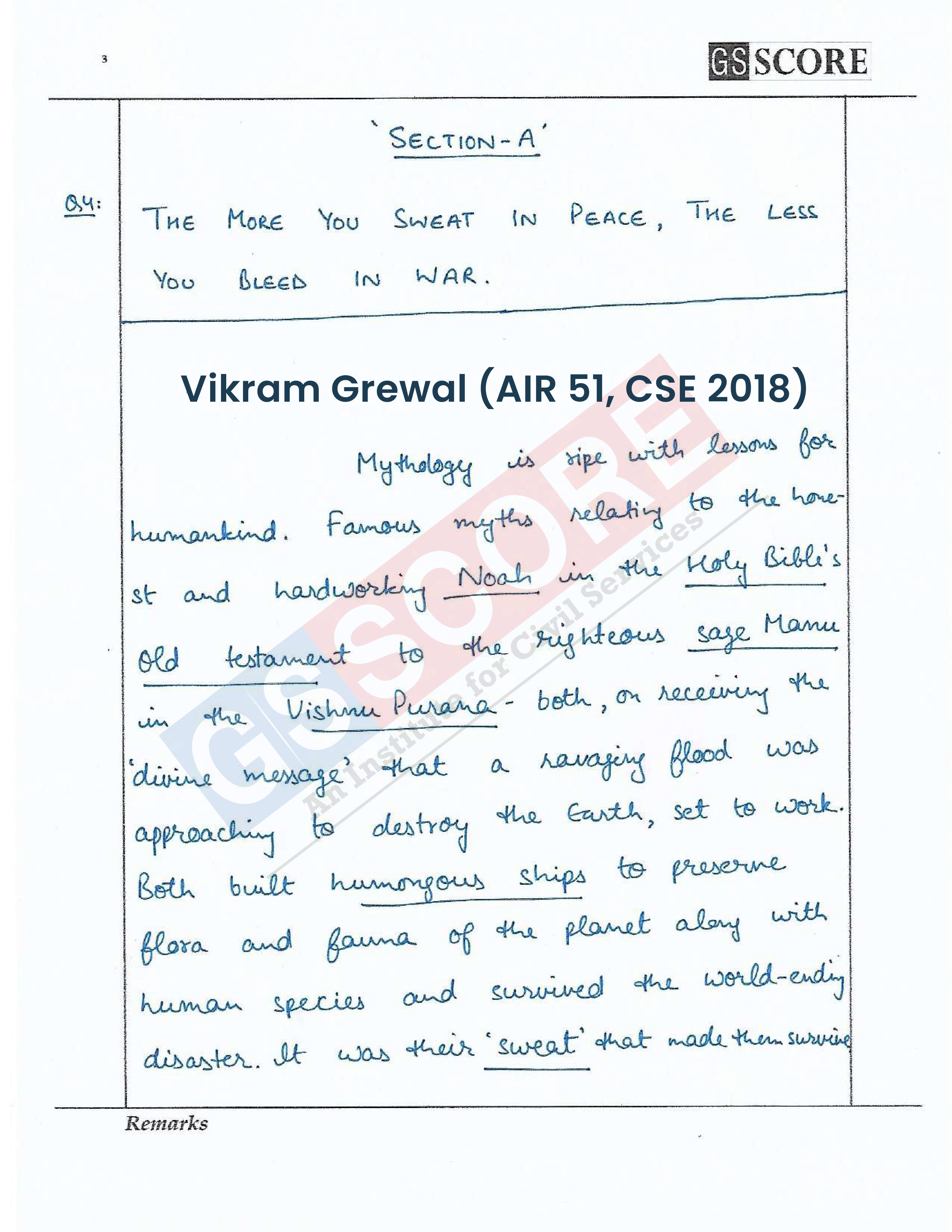
For full copy click here
What an essay writing should not be....
- It should not be a mere compilation of information or facts.
- It should not be a long note.
- It should not be a brief note.
- It should not be a theoretical exposition.
- It should not be a conglomeration of great ideas by great people.
What constitutes a good essay?
A good essay should have three distinct parts-
- Introduction
- Description
A good essay should be close to its subject or theme throughout the write up.
Essay Writing Strategy by Vikram Grewal (AIR 51, CSE 2018), A must watch session for more clarity.
A good essay should reflect...
- Understanding of the writer
- Thoroughness of the writer
- Analytical capacity of the writer
- Research and analytical capability of the writer
- Reading habits of the writer
For Example:
Vikram Grewal's Copy, all the following things are considered by him:
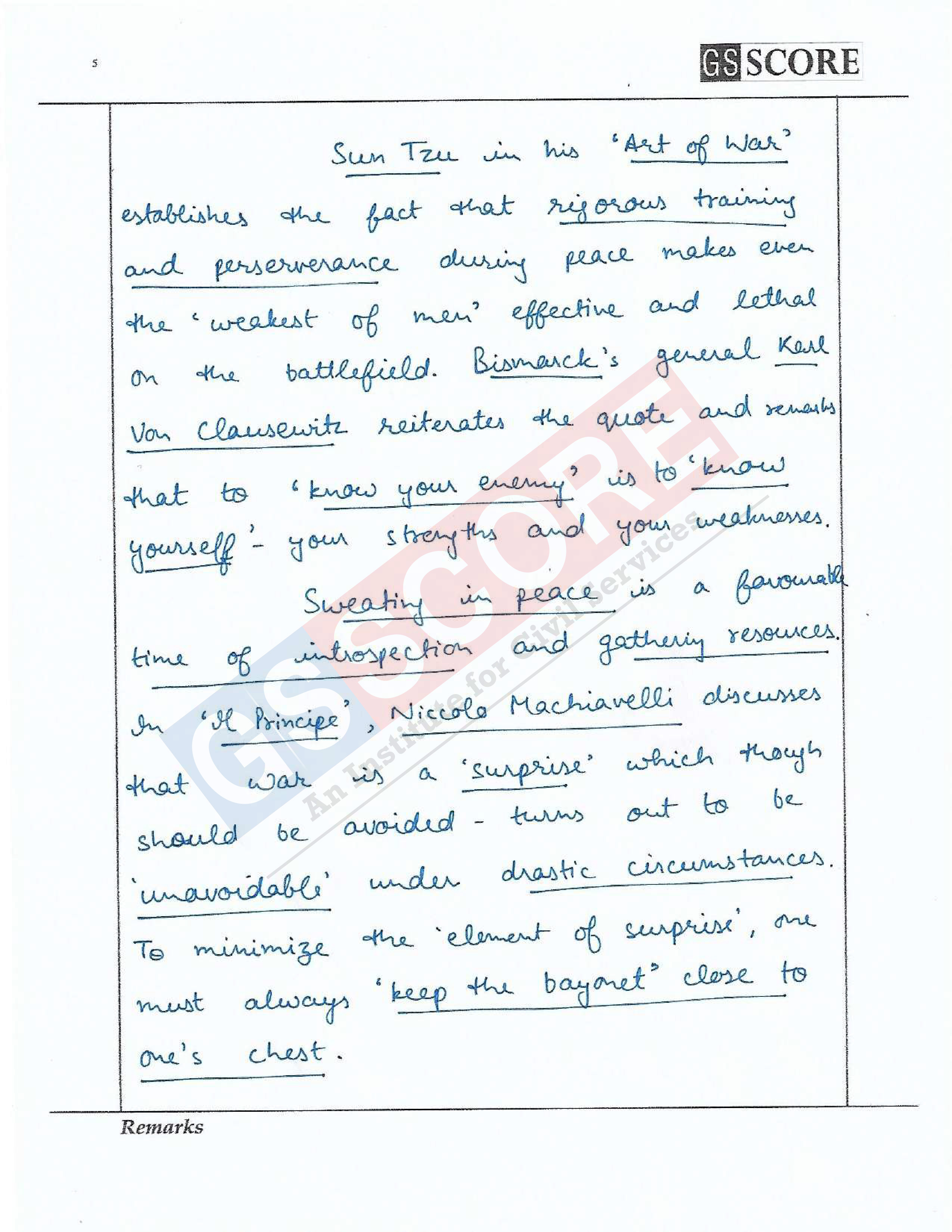
Click Here for Full Copy
Essay needs a higher level of communication abilities viz..
- Articulation
- Effective expression
- Logic, flow and rhythm
- Right grammar
Brief for practicing essay writing – pre exam hall approach.
How to write a good Essay can be viewed sequentially, as if going through ten sequential steps in an essay writing process.
- Research : Begin the essay writing process by researching your topic, making yourself an expert.Assuming you've been given a topic, or have narrowed it sufficiently down, your first task is to research this topic. You will not be able to write intelligently about a topic you know nothing about. To discover worthwhile insights, you'll have to do some patient reading and information gathering. Though IAS aspirants are hard pressed of time but don’t forget it is of 250 marks and highly neglected. It can be done through integration of your daily newspaper reading and through preparation of GS also. But you need some different strategy to do so.
- Analysis : Now that you have a good knowledge base, start analyzing the arguments of the essays/articles you're reading. Clearly define the claims, write out the reasons, the evidence, etc. Look for weaknesses of logic, and also strengths. Learning how to write an essay begins by learning how to analyze essays written by others.
In case of analysis Vikram Grewal shows it perfectly: Here is a look
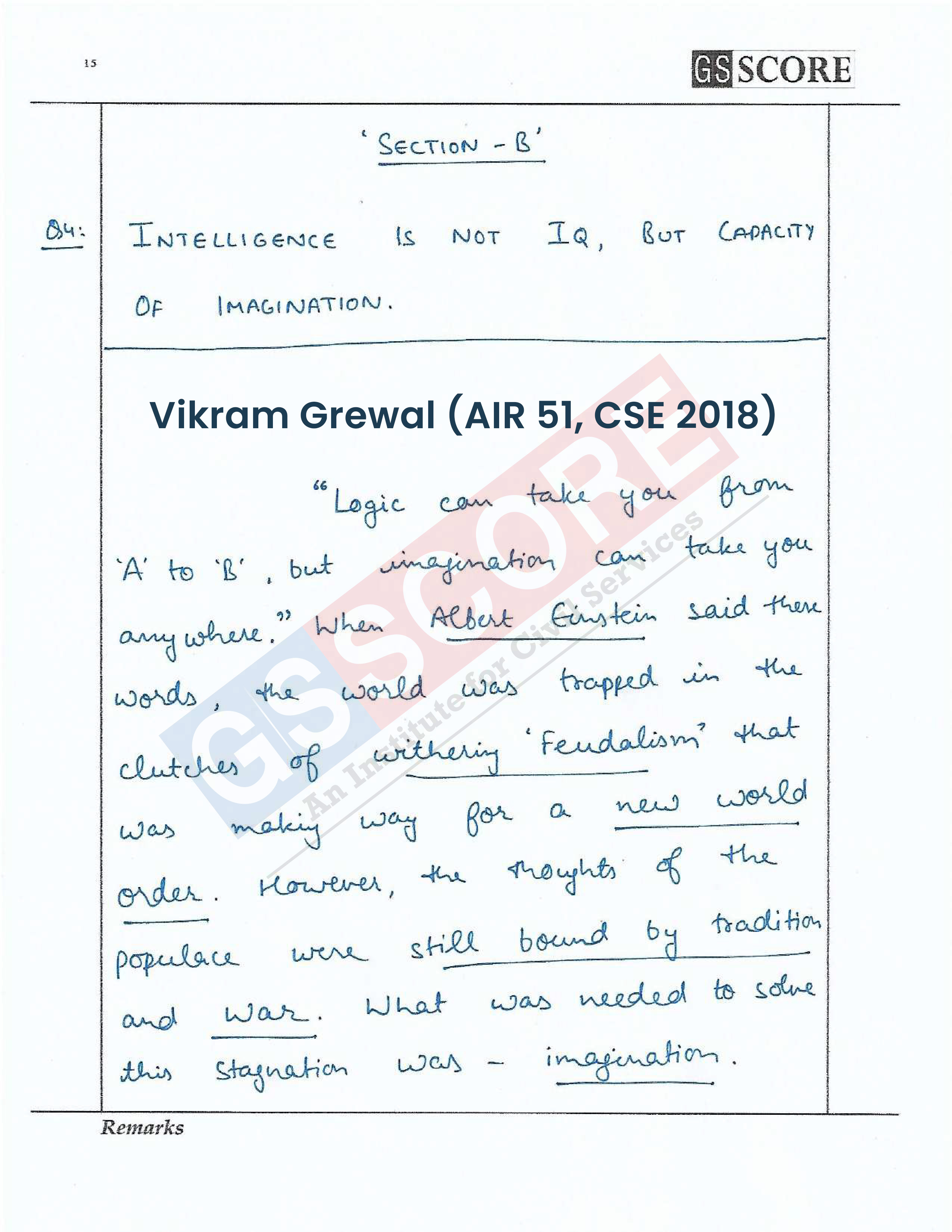
For Full Copy Click Here
3 .Brainstorming : Your essay will require insight of your own. Ask yourself a dozen questions and answer them. Meditate with a pen in your hand. Think and think until you come up with original insights to write about.
- Thesis: Pick your best idea and pin it down in a clear assertion that you can write your entire essay around. Your thesis is your main point, summed up in a concise sentence that lets the reader know where you're going, and why. It's practically impossible to write a good essay without a clear thesis.
- Outline: Sketch out your essay before straight away writing it out. Use one-line sentences to describe paragraphs, and bullet points to describe what each paragraph will contain. Play with the essay's order. Map out the structure of your argument, and make sure each paragraph is unified.
- Introduction: Now sit down and write the essay. The introduction should grab the reader's attention, set up the issue, and lead in to your thesis. Your intro is merely a buildup of the issue, a stage of bringing your reader into the essay's argument.(Note: The title and first paragraph are probably the most important elements in your essay. This is an essay-writing point that doesn't always sink in within the context of the classroom. In the first paragraph you either hook the reader's interest or lose it.)
- Paragraphs: Each individual paragraph should be focused on a single idea that supports your thesis. Begin paragraphs with topic sentences, support assertions with evidence, and expound your ideas in the clearest, most sensible way you can. Speak to your reader as if he or she were sitting in front of you. In other words, instead of writing the essay, try talking the essay.
- Conclusion: Gracefully exit your essay by making a quick wrap-up sentence, and then end on some memorable thought, perhaps a quotation, or an interesting twist of logic, or some call to action. Is there something you want the reader to walk away and do? Let him or her know exactly that.
- Style: Format your essay according to the correct guidelines for citation. All borrowed ideas and quotations should be correctly cited in the body of your text, followed up with a Works Cited (references) page listing the details of your sources.
- Language: You're not done writing your essay until you've polished your language by correcting the grammar, making sentences flow, incorporating rhythm, emphasis, adjusting the formality, giving it a level-headed tone, and making other intuitive edits. Proof read until it reads just how you want it to sound. Writing an essay can be tedious, but you don't want to bungle the hours of conceptual work you've put into writing your essay by leaving a few slippy misspellings and poorly worded phrases.
Steps to be followed during examination:
We must keep in mind that an essay writting in the examination hall is developed on the spot within a given time period, is something different from an essay written leisurely and with mature deliberation for a publication or for a prize competition.
A Candidate writing an essay for Civil Service Examination should keep in mind that he has to satisfy the examiner with regard to 3 things:
- He has good ideas on given subject / chosen field.
- He can arrange his ideas systematically.
- He can express, and analyze his opinion correctly using good language.
Required Steps to create a rough sketch before actual writing :
- Selection of suitable topic
- Make an outline of your ideas
- Write introduction points
- Write main points of the body
- Brief sketch about view, history, facts, illustrations, examples etc
- Idea about critical discussions, pro and opposite views
- Drawing a conclusion that clearly expresses your opinion and always end with a futuristic note
Selection of topic is the key for scoring in essay writing . Around 15 to 20 minutes can be spent on choosing best topic. we also needs to be sure about the flow of thought, rich facts and figures, history, analytical expression and all to be collectively rated high in the selected topic. It impacts your marks. Out of six topics consider each one independently in-depth your knowledge and presentation skills not in bird-eye-view manner.
Patience and perseverance must be maintained while selecting a topic and make it sure about excellence to present cogently.
Next step is outlining the selected topic by putting ideas in a separate page, in organized form by writing sub topics and important points to be covered in the essay. For this one can make use flow chart model or line chart or tabulation. Grouping of thoughts must in a way to categories the sub headings while writing the detailed essay. We can use 15 to 20 minutes for this task.
Then start with the introduction which can be a dialogue, quotation or anecdotes produces complete idea to the reader about the essay. A dialogue could be simply the pertinent fact that explicitly illustrates the point you are planning to make. An anecdote is stories that illustrate the point. Be sure your anecdote is short, precise and relevant to the topic.
Three problems that candidates face while writing an essay. They are:
- Coherent arrangement
- Expression Ideas
Essay Copy: Vikram Grewal(AIR 51, CSE 2018)
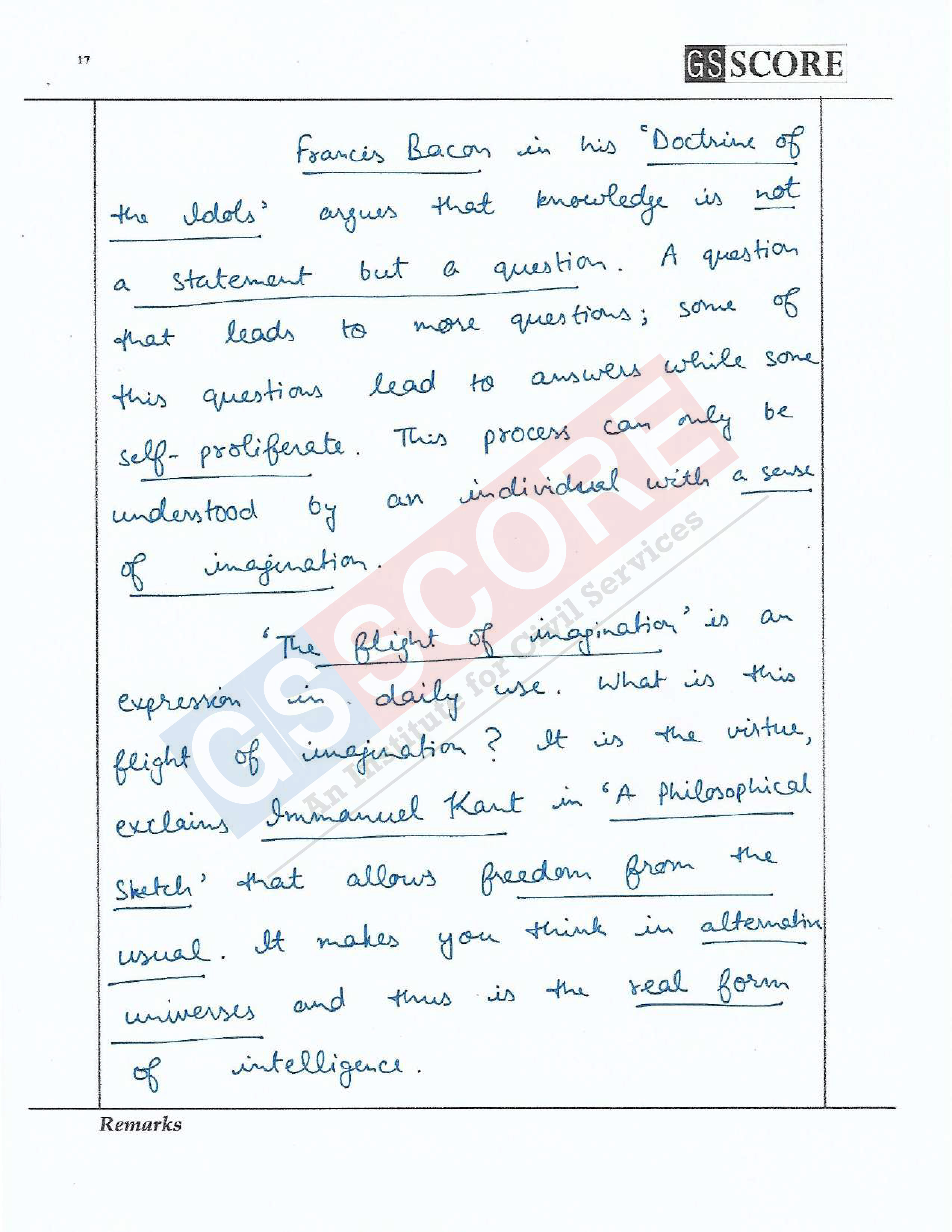
About the subject is nothing but knowledge that needs to be looked in different perspective, whether social, economical, political, religious, cultural, literary, national, and environmental. Candidate should think on different questions
- What are definition / scope / history of the topic?
- What can be said on particular subject from various perspectives?
- What are positives / negatives?
- Answers for different questions/dimensions
- your thought for critical appraisal
Arrangement :
Arrangement of an essay means the contents with a definite structure to be framed. The structure must be exposed indirectly through the flow of writing with interlinking of sub topics and paragraphs explaining the scope meaning, description and discussion.
Illustration and quotations known can be presented lively aptly to increase the richness of the content. It is like the flavor added to the dishes to attract the reader to be perfectly relevant to the topic/ argument. If the Quotations exceed unnecessarily, it will disturb the quality of presentation. Interlinking of thoughts, comparison and contrasting viewpoints can be expressed only with the special reference to the application of thoughts.
Opinions and arguments with strong self explanatory sentences will reflect the candidates’ solid and clear understanding of the subjects.
Now you need to give the powerful and logical conclusion which is the consequence of everything discussed earlier. Conclusion brings the reader closure or summing up of points and also gives final perspective. It should not be rhetoric outburst. It must be balanced and free from prejudice. Mind it, give proper space to the conclusion. Don’t sump in haste.
Do s and Don’ts for that ‘killer’ 3 Hrs:
- Read the title, understand the meaning and scope.
- Think and comprehensive planning before start.
- Effective, brief and strong words consist of good thoughts makes your essay best.
- Avoid vague generalization, slang’s and colloquialism
- Don’t try to present whatever you know on the subject.
- In controversial topic discuss pros and cons dispassionately and give effective conclusion.
- Length of essay is not fixed. But don’t be exhaustive. This time you may to write multiple essay
- Never forget to read and revise the essay written before submission to examiner.

Verifying, please be patient.
Our Centers
DELHI (Karol Bagh)
GS SCORE, 1B, Second Floor, Pusa Road, Karol Bagh, New Delhi - 110005 (Beside Karol Bagh Metro Station Gate No. 8)
Get directions on Google Maps
BHUBANESWAR (Jaydev Vihar)
GS SCORE, Plot No.2298, Jaydev Vihar Square, Near HCG Day Care, BBSR - 751013
LUCKNOW (Aliganj)
GS SCORE, 2nd Floor, B-33, Sangam Chauraha, Sector H, Aliganj, Lucknow, UP - 226024

© 2024 IAS SCORE. All Rights Reserved
Welcome to our secure login portal. Access your account with ease.

- Using Password
Not registered yet? register here!
Welcome to our secure register portal. For a brighter future, register now and unlock endless learning opportunities.
User Register
Already have an account? Login
Oops, forgot your password? Don't worry, we've got you covered. Reset it here
Lost your login details? No problem! forgot your password in just a few clicks
Forgot Password
Verify your mobile number, you have successfully logged in.
Join Us on WhatsApp
- International
- Today’s Paper
- Premium Stories
- Express Shorts
- Health & Wellness
- Board Exam Results
UPSC CSE 2021: AIR 17 Sarthak Agrawal’s step-by-step strategy for essay paper
Essay is the one paper for which you will find excellent advice all over the internet - mostly on university websites - so make sure to look at them instead of just relying on the typical upsc resources, says agrawal .
My key advice for the essay paper is to be argumentative and imaginative. An academic essay is a formal piece of writing with a clear structure. This is the one paper for which you will find excellent advice all over the internet — mostly on university websites — so make sure to read them up instead of just relying on the typical UPSC resources.
The following approach worked best for me: start with a story that is relevant to the prompt. Then, state in a few words the “thesis” of your essay – what is the main argument you’re making? Next, support this central thesis with several claims, each one backed by strong evidence or reasoning, and occupying a separate paragraph. As you go along, address the counterclaims. But resist the urge of writing an essay like a mystery novel. This is best practiced when you have devoted some 10-20 minutes to plan and outline what you will write.

Ultimately, the key to putting together a strong response is to make an innovative and strong argument – don’t just provide relevant information around the central topic but take a refined stand and stick to it. For instance, if I wrote an essay on the topic, “Are we entering an era of globalisation”, I wouldn’t just regurgitate data on both sides of the debate. Instead, I would present an incisive and informed opinion defended by evidence and reasoning with an intention to persuade the reader. Remember, variety goes a long way in achieving this aim – avoid repetition and alter your sentence length and vocabulary to keep things interesting. It is also useful to vary the kind of evidence you cite. In some places, data and figures are most appropriate; in others, a vivid example can go a long way in hammering in your point.
When you choose a topic, first make sure that you fully understand what each word in the prompt means. I would prefer a simple one over a more convoluted statement so that you have more latitude to experiment. The next thing to ask is whether you will be able to construct a novel argument around that prompt. Some topics are more conducive to a descriptive type of response, and others to a debate. The latter provides more scope for showing off your critical thinking skills. That’s the real “smartness” essays test, which is why writing them well is a pre-requisite for academic success in the top universities. When you start, make sure you introduce the topic and what you understand by it. This way, even if you make an error in interpreting the prompt, the examiner will know from the get-go what you are responding to and might be a bit more generous.
I find the best essays often start and end with a story. My favourite argumentative pieces are those that feature in The Economist’s leaders’ section; they often start with examples to invite the reader’s interest. In the same vein, I spent time thinking about the kind of stories that would align with different topics instead of memorising quotations. For example, in a mock response to the topic, “Digital infrastructure is key for future ready governance”, I included a fictional example of a future health secretary who can get her department to respond quickly to a SARS-kind of virus in rural Odisha thanks to a mature National Digital Health Mission.

I wrote five practice tests before appearing for the exam; incidentally, none of them was the ‘philosophical type’ that I had to write in the actual paper. The same advice applies for these kinds of essays too, except that the evidence here would be real-world examples and logical reasoning instead of data. There’s also more scope to be creative and critical, which is good for fetching higher marks. I think coaching institutes tend to be overly concerned about analysing the “social, economic, political, legal etc.” angles in an essay, while the essay is an argumentative piece of writing that provides the means to showcase your creativity. It is certainly not a test of your memory, vocabulary, or handwriting so don’t worry if you are a laggard on either (or all) of these.
A word on formatting — start a new paragraph from the middle of the line, leaving a forefinger’s space in the beginning. Try to connect one sentence with the next using bridge words like however, despite, moreover, etc; do the same for paragraphs as it gives the entire piece a nice, logical flow. Underlining important keywords and phrases is also useful to direct an examiner’s attention. Keep cuttings to a minimum and ensure that all paragraphs are of similar length, but these tips are much harder to follow in practice. And it’s okay to use the first person (“In this essay, I argue…”). Bureaucrats are taught to be self-effacing and not present their own front but when writing an academic essay, I think it’s best to lead with the first person.
Finally, even the examiners know that writing a strong 1000–1200-word piece by hand in 1.5 hours that is sufficiently argumentative and delightfully imaginative is fiendishly difficult. They will definitely cut you some slack as long as your approach is right. Make the most of this window, and good luck!
(The author is AIR 17 in UPSC Civil Services 2020 and is a researcher at the World Bank)

How India pulled off its first general election Subscriber Only

Delhi’s Urdu Bazar and the decline of a language Subscriber Only

UPSC Key— 11th April, 2024: Curative plea, Time standard for Subscriber Only
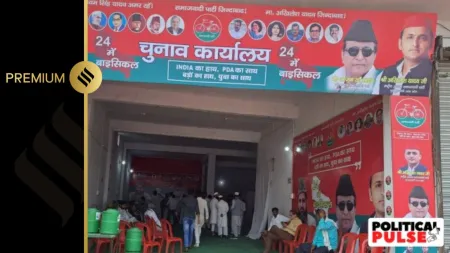
In Rampur: Azam Khan is omnipresent; SP unit's revolt and Subscriber Only

Why SC's curative petition relief for Delhi Metro is significant Subscriber Only

Ansaris of Ghazipur Subscriber Only

Akbar’s ideology of Sulh-i-kul Subscriber Only

Amid CAA talk, the lives caught in India-Bangla enclave swap Subscriber Only

The simple philosophy behind Carlo Ancelotti's subtle managerial genius Subscriber Only
- UPSC Civil Services

EOW arrests close aide of Cox and Kings owner in Rs 400 crore Yes Bank fraud case. British national Ajit P Menon, wanted for three years, was arrested at Cochin International Airport. EOW suspects he diverted loan money to foreign companies. Menon named managing director of sister concern but appointment not on records.
- Stock Market Live Updates: Sensex, Nifty open lower 25 mins ago
- AP Inter Results 2024 Live Updates: Websites to check results - bie.ap.gov.in, education.indianexpress.com 31 mins ago
- Lok Sabha Elections 2024 Live Updates: Rahul Gandhi to address election rallies in TN, to share stage with Stalin 35 mins ago
- Manabadi AP Inter Results 2024 Live Updates: BIEAP 1st, 2nd year marks memo soon 40 mins ago

Best of Express

Buzzing Now

Apr 12: Latest News
- 01 What are the perils of artificial lights to trees and nocturnal animals?
- 02 Gujarat: Nomination of candidates to begin today
- 03 MVA is a three-wheeler with mismatching spare parts: Amit Shah
- 04 Canadian brand offers Indian techie $10,000 in apology after mocking his surname
- 05 Won’t relinquish Gadchiroli guardianship: Devendra Fadnavis
- Elections 2024
- Political Pulse
- Entertainment
- Movie Review
- Newsletters
- Gold Rate Today
- Silver Rate Today
- Petrol Rate Today
- Diesel Rate Today
- Web Stories
General Studies
All Programmes
Study Material
UPSC Essay Topics - Important Essay Topics for UPSC Mains 2023
By vajiram & ravi.
Essay Course for UPSC
UPSC CSE Mains 2023 Essay Question Paper
UPSC Mains Optional Test Series
Mentorship Program for UPSC 2024
Understanding UPSC Essay Topics holds significant importance as it evaluates the candidate's ability to analyse, present arguments, and communicate effectively. In this article, we will explore the diverse range of UPSC essay topics, their significance, and essential tips to excel in this section. Get ready to enhance your writing and analytical skills and make a strong impression on the evaluators with well-crafted essays.
UPSC Essay Paper
The Essay paper in the UPSC Mains examination requires candidates to write multiple essays , each on a different topic, chosen from a given list of options. The essay topics for UPSC cover a wide range of issues, including social, economic, political, cultural, and philosophical aspects, both national and international.
The essay paper holds significant weightage in the UPSC Mains examination, contributing 250 marks out of the total 1750 marks . Scoring well in this section can have a considerable impact on the overall ranking and selection for the coveted civil services.
Weekly UPSC Essay Topics By Vajiram & Ravi
The UPSC Essay Paper is an opportunity for candidates to demonstrate their proficiency in expressing ideas and analysing complex issues. Vajiram & Ravi Pensive-Weekly Essay Writing Programme provides you with two Essay Topics every Saturday based on the previous year's question papers and the changing trends analysis. You can submit your Essay for peer evaluation on vajiramandravi.com. This will help you nourish your writing skills, give you clarity of thought, and build the capacity to express opinions in a logical and coherent manner.
Important Essay Topics for UPSC 2023
The purpose of the essay paper is to assess the candidate's ability to critically analyse a topic, present well-structured arguments, and communicate their ideas effectively. It also evaluates their knowledge of various issues, their clarity of thought, and their capacity to express opinions in a logical and coherent manner.
Some of the Important Essay Topics to prepare for the UPSC Mains Examination 2023 are:
- Gender Equality
- Environment/Urbanization
- Economic Growth
- Federalism/Decentralization
- Agriculture
- Economics
UPSC Essay Topics on Philosophy
Every year, UPSC typically provides you with two or more essay topics centred around philosophical thoughts, Indian philosophical schools, or quotes from notable personalities. To effectively address these philosophical topics, you should refer to Philosophy Books to gain a foundational understanding. Here is a list of UPSC Essay Topics on Philosophy :
- Everything comes to him, who hustles while he waits.
- We are always blind as we want to be.
- You cannot step twice in the same river.
- A disciplined mind brings happiness.
- The price of Greatness is Responsibility.
- People would rather Believe than Know.
- Mind - A beautiful Servant? Or a dangerous Master?
UPSC Essay Topics on Art and Culture
The UPSC Essay Topics related to Indian society, art, and culture cover a wide range of subjects, offering great diversity. To gain knowledge about the static content on these topics, you should rely on fundamental books on society, as recommended for the exam. Here is a list of UPSC Essay Topics on Indian Art and Culture :
- Culture changes with economic development.
- Culture is what we are, Civilization is what we have.
- Social reform is a myth if places of worship are open only to all castes and not to all genders.
- Impact of Globalization on Indian Art and Culture.
- Caste System - India’s Enduring Curse.
- Godmen - A Threat to Indian Art and Culture?
UPSC Essay Topics on Science and Technology
UPSC essay topics on Science and Technology can largely be addressed through current affairs. You may also benefit from consulting a Science and Technology Book for UPSC to compose a comprehensive and well-rounded essay. Here are some UPSC Essay Topics on Science and Technology:
- Deglobalisation is good for the world.
- Science is organised Knowledge. Wisdom is Organised life.
- Technology is a Weapon against Poverty.
- Prioritising Education Technology for Global Growth.
- Technology is the silent factor in International Relations.
- Scientific and Technological Progress cannot be equated with Human Progress.
UPSC Essay Topics on Education
Education stands as one of the preferred UPSC Essay Topics, with an essay related to this subject often appearing in the paper each year. To tackle this topic effectively, you should stay abreast of Current Affairs , incorporating significant changes and advancements in the field. Let's explore some of the Essay topics for UPSC centred around education:
- Self Education is a lifelong curiosity.
- Education Breeds Peace.
- Education is a progressive discovery of our own ignorance.
- Education must also train one for quick, resolute and effective thinking.
- Schooling is not Education.
UPSC Essay Topics on Polity and Governance
To comprehensively address Polity and Governance topics, you should acquire fundamental knowledge from Polity Books for UPSC and Current Affairs. These resources offer static information about relevant issues and their historical context, which proves valuable while writing UPSC Essay Topics on Polity. Here are some Essay Topics on Polity and Governance:
- The Role of Politics in Development.
- Should Youth in India Consider Politics as a Career?
- Art, Freedom and Creativity will change society faster than politics.
- The politics of Identity is the Politics of the Weak.
- People should not be afraid of their Government. The Government should be afraid of its people.
- Government Surveillance - Good or Bad?
UPSC Essay Topics on Economy
Essays concerning economic growth are frequently included in the Essay Paper. To tackle these topics effectively, you should refer to Economy Notes for UPSC to gain a comprehensive understanding. Once the fundamentals are grasped, you can enhance their essays by incorporating examples, data, and statistics to create a multidimensional perspective. Here is a list of UPSC Essay Topics on Economy:
- We don't have to sacrifice a Strong Economy for a Healthy Environment.
- India, a $5 trillion Economy - Dream or Reality?
- Digital Economy: A leveller or a source of Economic Inequality?
- Innovation is the key determinant of social welfare and economic growth.
- Labour Reforms in India and its Role in Economic Growth.
UPSC Essay Topics on Social Issues
Social issues are a significant aspect of the UPSC essay paper, reflecting the candidates' understanding of societal challenges and their ability to propose viable solutions. These essays provide a platform for candidates to analyse, critique, and suggest measures for pressing social concerns. Topics related to social issues in the UPSC Essay paper may include:
- Inclusivity and Plurality are the hallmarks of a Peaceful Society.
- A Gender-sensitive Indian Society is a prerequisite for Women and Child Empowerment.
- The weaker sections of Indian Society - are their Rights and Access to Justice getting Better?
Previous Year UPSC Essay Topics
Practising previous year's essay topics will help you become familiar with the UPSC exam pattern , word limit, and the types of essay questions frequently asked in the Mains Examination. Analysing past essay topics will also allow you to identify recurring themes and trends, enabling you to prioritise their preparation accordingly. Regular practice with past essay topics will instil confidence in you, helping you feel more comfortable and prepared for the actual exam.
- Forests are the best case studies for economic excellence.
- Poets are the unacknowledged legislators of the world.
- History is a series of victories won by the scientific man over the romantic man.
- A ship in the harbour is safe, but that is not what a ship is for.
- The time to repair the roof is when the sun is shining.
- A smile is the chosen vehicle for all ambiguities.
- Just because you have a choice, it does not mean that any of them has to be right.
Tips to Excel in UPSC Essay Paper
- Understand the Topics: Thoroughly comprehend the essay topics, including the keywords and instructions. Choose a topic that aligns with your strengths and interests.
- Plan and Structure: Devote some time to plan your essay. Create an outline and organise your thoughts in a structured manner, with a clear introduction, body, and conclusion.
- Be Objective: Present balanced arguments and avoid a biased or one-sided approach. Consider multiple perspectives and present a holistic view.
- Provide Examples and Evidence: Support your arguments with relevant examples, data, quotes and evidence to strengthen your essay.
- Maintain Clarity: Write in a clear and concise manner. Use simple language and avoid jargon or overly complex vocabulary.
- Practice Regularly: Regular practice is essential to improve Essay writing skills. Write essays on diverse topics to enhance your versatility.
- Time Management: Allocate appropriate time for planning, writing, and revising each essay to manage time effectively during the examination.
- Revise and Edit: Review your essays for coherence, grammar, and structure. Make necessary edits to refine your work.
FAQs on UPSC Essay Topics
What are the important UPSC Essay Topics?
Here is a list of UPSC Essay Topics asked in Mains Examination previously:
- Culture is what we are, civilization is what we have.
- Simplicity is the ultimate sophistication.
- What is research but a blind date with knowledge?
- Best for an individual is not necessarily best for society.
- Wisdom finds truth.
- Ships don’t sink because of water around them, ships sink because of water that gets into them.
- Patriarchy is the least noticed yet the most significant structure of social inequality.
- Technology as the silent factor in international relations.
How do I Prepare for the UPSC Essay?
To prepare for the UPSC essay, focus on understanding the essay syllabus and past topics to identify recurring themes. Regularly practise writing essays on various topics to improve your writing skills and time management. Structure your essays with a clear introduction, main body, and conclusion.
Which is the best source to practise UPSC Essay Topics?
The best sources to prepare Essay for UPSC include official UPSC materials, newspapers, and magazines like The Hindu, Yojana , and Kurukshetra for current affairs, standard books on diverse subjects, government reports and publications, online platforms like PIB and PRS India, UPSC previous year papers for understanding the exam pattern, and regular practice of essay writing on various topics.
© 2024 Vajiram & Ravi. All rights reserved

5 Essential Steps: How to Write an Essay in UPSC Mains
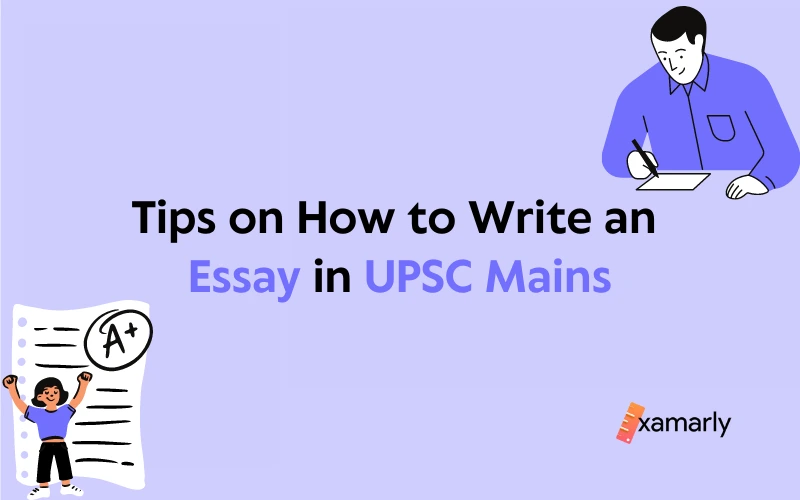
Writing an essay in the Union Public Service Commission ( UPSC ) Mains examination can be a daunting task for many aspiring civil servants.
The essay paper carries a weightage of 250 marks and requires a high level of language proficiency, analytical thinking and writing skills. The essay is also one of the few opportunities for candidates to showcase their knowledge and views on a wide range of topics and make a lasting impression on the examiners.
In this blog, we will provide you with steps and strategies on how to write an essay in UPSC Mains exam.
Whether you are a first-time aspirant or an experienced candidate, you will find useful insights to help you approach the essay paper with confidence and write an essay that stands out. So, let’s get started!
UPSC CSE Mains Essay Writing Exam Pattern
What is a good score in essay writing paper in upsc mains, structure of an essay in upsc mains, 5 essential steps: how to write a well-structured essay in upsc mains, 1. t- time limit, 2. i- introduction, 3. p- paragraphs and pointers, 4. c- conclusion, 5. r- revision, strategy for essay writing in upsc mains exam, 1. the central idea is the key, 2. brainstorming for a better idea, 3. making a blueprint, essential elements of essays in upsc mains, the super 3, the supportive 3, personal comments and opinions, reference books for essay writing in upsc mains, faqs on how to write an essay in upsc mains exam, what is the format of an essay in upsc mains, how to choose a topic for an essay in upsc mains, how to write the introduction of an essay in upsc mains, how to write the body of an essay in upsc mains, how to write the conclusion of an essay in upsc mains, what are some common mistakes to avoid when writing an essay in upsc mains.
- How to improve one's essay writing skills for UPSC Mains?
- The paper comes under the UPSC CSE Mains exam in which two essays must be written within 3 hours, each within a 1000-1200 word limit.
- Each carries 125 marks, so the total is 250 marks.
- The paper is divided into two sections, each carrying a choice of 4 essays. The aspirant has to choose only one from each section.
- UPSC CSE Syllabus clearly instructs aspirants to keep their thoughts close to the subject and arrange their ideas accordingly. It further states that credit will be given for effective essays and coherent expression’.
Also Read : How To Complete UPSC Mains Paper in 3 Hours? – A Clear-Cut Guide
The essay paper counts for up to 250 marks. A score above 50% could be considered good. 125 is the perfect example.
A score of around 110-125 is considered average.
For an exceptional essay, you might score a perfect mark in the range of 150-160.
How to structure an essay for the UPSC exam is the first and foremost thing that should be learnt while taking into consideration how to write an essay in UPSC Mains.
The traditional way of UPSC CSE Mains essay writing is to break it into paragraphs with pointers in simple language. This technique is still working in structuring an informative and well-written essay for UPSC Mains.
A body paragraph is of utmost importance besides the introduction and conclusion part. The body paragraph contains important facts, figures, data, and information along with several relevant quotes.
Here are some points regarding the structuring of an essay in the form of an introduction, body, and conclusion that will help you in writing a well-balanced essay.
- The introduction part is the most important of all. Your introduction creates a first impression on the examiner. Your essay should always have a good starting and a conclusion.
- Body paragraphs are equally important parts of the essay that can be supportive, critical, or narrative. However, it is advised to have a mature thought process in all forms and to not take any side or get emotional in writing a certain opinion.
- Essays, along with facts and language skill also demands your opinion that should be written in a well-balanced way. The narrative part should be written by starting with an argument along with different facts.
- Further, a supportive paragraph is necessary to contain positive facts/ideas. Talking of a critical paragraph, it is advised to place it in the last part with the exact expression. However, it depends on your will. You can also open with a critical part.
- The conclusion is also crucial as it can bring you additional marks if done properly. Your concluding statement reveals a lot about you, as balancing every statement after a lot of critical evaluation and facts is a form of art.
Related Reading: How To Start Answer Writing Practice For UPSC: 5 Effective Pointers
Remember the mnemonic provided here that will help you to keep the important pointers in mind on how to write an essay in UPSC Mains.
Stick to the TIPCR formulae always. If you write with this structure, along with filling in a good amount of content, you are definitely going to score well in this paper.
Time management is very important for UPSC CSE Main essay writing. You get 3 hours to write two essays in the exam which means you have 1 hour and 30 minutes for each essay.
It is a fact that any aspirant needs 45 minutes to 1 hour to write one essay. Another 10 minutes is required for the revision of one essay.
Before all this, you need at least 20-30 minutes to brainstorm, jot down some points, and make an outline. Dividing the time and sticking to it is the only key to scoring good marks.
A good start of the introduction always arises the interest in the examiner. The examiner’s judgment and how they are going to take your whole piece depends on your starting.
If you start well, you must also end in an impressive manner. A good introduction can be a brief explanation of the given topic and you can make it effective by adding some quotes, a critical narrative, or your own narrative.
Paragraphs and pointers provide a smooth flow to your essay which not only looks like a structured essay but also feels like a more informative but less hectic to read a piece of writing.
Paragraphs in small chunks or pointers like short paragraphs provide an establishment that leads towards a conclusion.
Examiners are habitual of reading something in an ordered way, especially in Mains essay writing section.
Finishing on a good or smooth note is as important as starting on a good note. A smooth and positive conclusion with a clear explanation will help you in scoring good marks.
There should be a ‘Cyclic-return’ approach in your essay. The introduction should end with a question or discussion and in the conclusion, you can again come to that question to conclude it with a positive statement or anecdote.
To revise or read your whole piece in the entirety is as important as writing it. Keep a check on grammatical mistakes, and some missing points, or make sure your answer looks clean and tidy.
These things can be done only when you revise your answer. Add/omit some words as per your demands but should not be overdone.
You Might Also Like: How To Prepare For UPSC Prelims And Mains Together Like An Absolute Pro!
Just like the UPSC CSE your essay writing also needs planning. There are broadly three steps to writing a structured essay defining what the essay is going to talk about i.e. the central idea, brainstorming, and making a blueprint of it.
Mains essay writing demands a well-structured format from your side as it is one of the most prestigious and tough examinations in India .
“Innovation is the key determinant of economic growth and social welfare” .
This is basically a thesis statement of an essay question of UPSC CSE Mains 2016. In this statement, the central idea is ‘innovation’.
Here, the aspirant is supposed to bring out a dimension of innovation that directly or indirectly affects economic growth and social welfare. Aspirants are supposed to write that statement of facts only which supports the central idea or those statements that supplement the overall idea.
Brainstorming is one of the most powerful tools in the examination phase. Brainstorming leads to developing new ideas quickly or listing those ideas that align with your knowledge of the given topic.
There is no specific rule or technique for brainstorming, instead, you can jot down points on a paper that are necessary for your Mains essay writing.
Making a blueprint or outlining your essay means deciding what to write in the introduction, body, and conclusion parts. What ideas to represent in which section, which quotes are relevant to the given thesis, etc.
Before the actual writing, it is very important to see it in its entirety. It helps you to see the big picture. The blueprint also helps you in finding the right conclusion to wrap up your essay.
Check Out Our Blog On: Why is Self Assessment for UPSC CSE Necessary?
- Social element
- Political element
- Economical element
These three points should be considered while writing an essay. These three elements give a proper shape to an essay or any piece of the thesis.
Writing a formal one always demands dimensions and these three dimensions will always support your arguments concerning various areas of society. It enhances the effectiveness and creates a proper report-like structure along with your narratives to form well-balanced and good writing in your Mains essay writing.
- Constitutional
- Technological
These three additional dimensions also enhance the quality of your writing. You can use various technological perspectives, constitutional facts, remedies, laws, and legal terms to support the thesis in your Mains essay writing.
Your opinions matter a lot. UPSC CSE Mains essay writing demands a subjective approach to writing. It is very important to express your personal opinion on the issue or the given statement.
However, it should be kept in mind that your personal opinions should not be too biased in nature. Neutral and well-balanced writing is always appreciated by the UPSC.
Additional Reading: 3 Ways to Build a Revision Strategy for UPSC – A Must
You may seek help from books that will assist you with Essay Writing for UPSC Civil Services Exam.
- Essays for Civil Services and Other Competitive Examinations by Pulkit Khare.
- Essay Paper For Civil Services Main Examination by Pavneet Singh and Sonali Bansal
- Selected Contemporary Essays by Saumitra Mohan (MHE)
- My Experiment With Truth by M.K. Gandhi
- J.L. Nehru Getting India Back on Track by Ratan Tata
In addition to the above-mebtioned books, you make take help of English newspapers such as The Hindu and the newspaper editorial section to expand your vocabulary.
Staying updated with the current affairs is also necessary. Take a look at the Best Current Affairs Magazine For UPSC to keep yourself informed about the latest events happening around the world.
Practice is the key to success. Focus on reading, the art of argumentation, and correct sequence to achieve good scores in essays. Remember there is no such thing as a perfect essay, just arrange the ideas in an orderly fashion and keep writing.
Essays in the UPSC Mains exam must be written with the help of facts and figures along with data, like statistics from a government report or any data from a major research paper that supports a writer’s perspective on a given topic.
Conversational form, the use of first-person references, and getting emotional with the audience are not allowed in a formal structure.
The points made by the candidate need to be neutral, supported by logical facts and not someone’s biased personal opinions. A certain degree of straightforwardness should be there while writing a formal exam, especially for an exam like UPSC CSE.
The tips mentioned above revolve around how to write an essay in UPSC Mains. These will help improve your writing skills and build a better essay structure.
Also Read: Powerful Tips on How to Stay Motivated for UPSC Preparation
The format of an essay in UPSC Mains is as follows: Introduction, Body, and Conclusion. The introduction should state the main idea of the essay and the body should elaborate on it with examples and arguments. The conclusion should summarize the key points made in the essay. The word limit for an essay in UPSC Mains is usually around 250-300 words.
Choose a topic that you are well-versed in and have a strong opinion on. It is advisable to choose a topic that is relevant to current events and has social and political significance. This will help you present a well-researched and thought-out argument in your essay.
The introduction of an essay in UPSC Mains should be concise and clear. Start with a hook that grabs the reader’s attention, state the main idea of the essay, and provide a thesis statement. The thesis statement should provide a clear direction for the rest of the essay.
The body of an essay in UPSC Mains should elaborate on the main idea presented in the introduction. Divide the body into paragraphs and make sure each paragraph has a clear focus and supports the thesis statement. Use examples, facts, and statistics to make your arguments more persuasive.
The conclusion of an essay in UPSC Mains should summarize the key points made in the essay and restate the thesis statement. End with a final thought or a call to action that provides closure to the essay. Make sure the conclusion is not repetitive and adds value to the essay.
Some common mistakes to avoid when writing an essay in UPSC Mains include: poor structure, unclear arguments, repetitive information, grammatical errors, and using informal language. Make sure to proofread your essay before submitting to avoid these mistakes.
How to improve one’s essay writing skills for UPSC Mains?
To improve your essay writing skills for UPSC Mains, you can practice writing essays on a regular basis, read newspapers and articles to stay updated on current events, improve your vocabulary, and seek feedback from peers and teachers.
Additionally, reading sample essays and learning from the writing style of experienced writers can also help improve your skills.
Related Posts
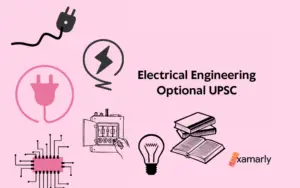
Electrical Engineering Optional UPSC
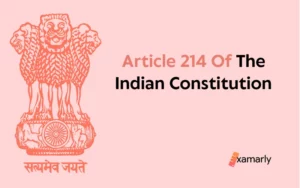
Article 214 Of The Indian Constitution: High Court For States
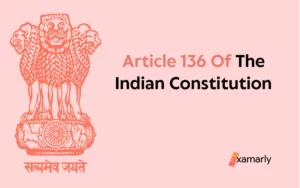
Article 136 Of The Indian Constitution
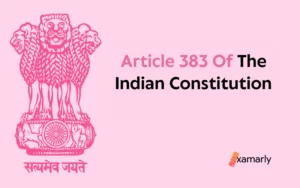

Article 383 of the Indian Constitution
- IAS Preparation
- UPSC Preparation Strategy
- Topic Wise Essay Questions From UPSC Mains 1994 2018
Last 25 Years Topic-wise Essay Questions From UPSC Mains (1994 - 2018)
Paper I of the UPSC Civil Services mains exam is the Essay. Here, prelims-qualified IAS aspirants have to write two essays out of a few given topics. The paper is for a total of 250 marks and its marks are taken into consideration for the Final Merit List. In this article, we have listed all the essay topics asked in the UPSC mains exam from 1994 to 2018. We have also classified the last 25 years essay questions into topics to make your preparation easier.
Latest – See the UPSC Essay Topics in the IAS Mains 2020 Essay Paper. Download UPSC Mains 2020 Essay Paper from the linked article.
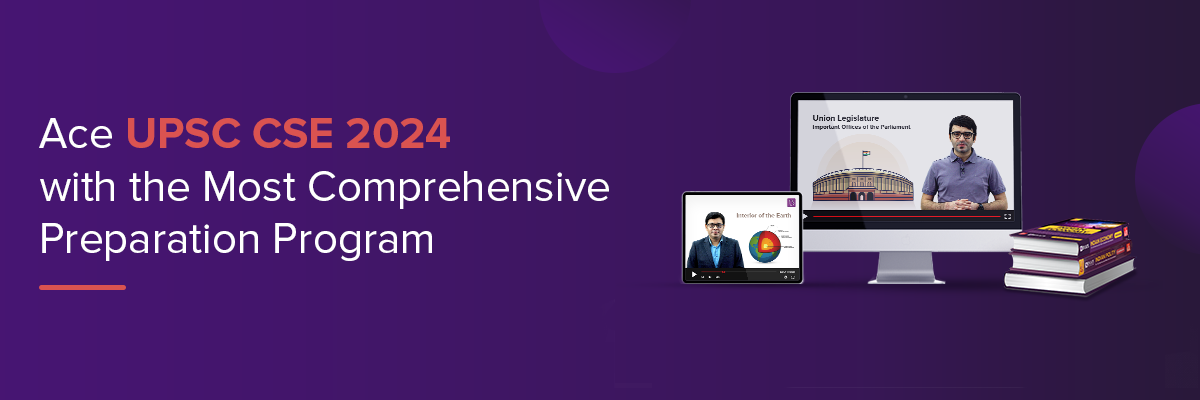
Explore The Ultimate Guide to IAS Exam Preparation
Download The E-Book Now!

UPSC Essay Topics
Administration.
- Politics, bureaucracy and business – fatal triangle. (1994)
- Politics without ethics is a disaster. (1995)
- The VIP cult is a bane of Indian democracy. (1996)
- Need for transparency in public administration. (1996)
- The country’s need for a better disaster management system. (2000)
- How should a civil servant conduct himself? (2003)
Democracy/India since independence
- Whither Indian democracy? (1995)
- What we have not learnt during fifty years of independence. (1997)
- Why should we be proud of being Indians? (2000)
- What have we gained from our democratic set-up? (2001)
- How far has democracy in India delivered the goods? (2003)
- National identity and patriotism. (2008)
- In the context of Gandhiji’s views on the matter, explore, on an evolutionary scale, the terms ‘Swadhinata’, ‘Swaraj’ and ‘Dharmarajya’. Critically comment on their contemporary relevance to Indian democracy. (2012)
- Is the colonial mentality hindering India’s success? (2013)
- Dreams which should not let India sleep. (2015)
- Management of Indian border disputes – a complex task. (2018)
Economic growth and development
- Resource management in the Indian context. (1999)
- GDP (Gross Domestic Product) along with GDH (Gross Domestic Happiness) would be the right indices for judging the wellbeing of a country. (2013)
- Was it the policy paralysis or the paralysis of implementation which slowed the growth of our country? (2014)
- Crisis faced in India – moral or economic. (2015)
- Near jobless growth in India: An anomaly or an outcome of economic reforms. (2016)
- Digital economy: A leveller or a source of economic inequality. (2016)
- Innovation is the key determinant of economic growth and social welfare. (2016)
- Impact of the new economic measures on fiscal ties between the union and states in India. (2017)
Federalism, Decentralisation
- The language problem in India: its past, present and prospects. (1998)
- Water resources should be under the control of the central government. (2004)
- Evaluation of panchayati raj system in India from the point of view of eradication of power to people. (2007)
- Is autonomy the best answer to combat balkanization? (2007)
- Creation of smaller states and the consequent administrative, economic and developmental implication. (2011)
- Cooperative federalism: Myth or reality. (2016)
- Water disputes between States in federal India. (2016)
Indian Culture & Society
- The Indian society at the crossroads. (1994)
- New cults and godmen: a threat to traditional religion. (1996)
- The composite culture of India. (1998)
- Youth culture today. (1999)
- Modernism and our traditional socio-ethical values. (2000)
- Indian culture today: a myth or a reality? (2000)
- As civilization advances culture declines. (2003)
- From traditional Indian philanthropy to the gates-buffet model-a natural progression or a paradigm shift? (2010)
- Judicial activism. (1997)
- Judicial activism and Indian democracy. (2004)
- Justice must reach the poor. (2005)
Social justice/Poverty
- Reservation, politics and empowerment. (1999)
- Food security for sustainable national development. (2005)
- The focus of health care is increasingly getting skewed towards the ‘haves’ of our society. (2009)
- Farming has lost the ability to be a source of subsistence for the majority of farmers in India. (2017)
- Poverty anywhere is a threat to prosperity everywhere. (2018)
Media & Society
- Misinterpretation and misuse of freedom in India. (1998)
- Mass media and cultural invasion. (1999)
- Responsibility of media in a democracy. (2002)
- How has satellite television brought about cultural change in Indian mindsets? (2007)
- Role of media in good governance. (2008)
- Does Indian cinema shape our popular culture or merely reflect it? (2011)
- Is sting operation an invasion on privacy? (2014)
Environment/Urbanisation
- Urbanization is a blessing in disguise. (1997)
- Protection of ecology and environment is essential for sustained economic development. (2006)
- Urbanisation and its hazards. (2008)
- Should a moratorium be imposed on all fresh mining in tribal areas of the country? (2010)
- We may brave human laws but cannot resist natural laws. (2017)
Economic sectors/MNCs
- Multinational corporations – saviours or saboteurs. (1994)
- Globalization would finish small-scale industries in India. (2006)
- BPO boom in India. (2007)
- Special economic zone: boon or bane? (2008)
- Are our traditional handicrafts doomed to a slow death? (2009)
- Is the criticism that the Public-Private-Partnership (PPP) model for development is more of a bane than a boon in the Indian context, justified? (2012)
- Tourism: Can this be the next big thing for India? (2014)
- Restructuring of Indian education system. (1995)
- Literacy is growing very fast, but there is no corresponding growth in education. (1996)
- Irrelevance of the classroom. (2001)
- Privatization of higher education in India. (2002)
- Modern technological education and human values. (2002)
- What is real education? (2005)
- “Education for all” campaign in India: myth or reality. (2006)
- Independent thinking should be encouraged right from the childhood. (2007)
- Is an egalitarian society possible by educating the masses? (2008)
- Credit – based higher education system – status, opportunities and challenges. (2011)
- Is the growing level of competition good for the youth? (2014)
- Are the standardized tests good measure of academic ability or progress? (2014)
- Education without values, as useful as it is, seems rather to make a man more clever devil. (2015)
- Destiny of a nation is shaped in its classrooms. (2017)
- The new emerging women power: the ground realities. (1995)
- Greater political power alone will not improve women’s plight. (1997)
- Woman is god’s best creation. (1998)
- Women empowerment: challenges and prospects. (1999)
- Empowerment alone cannot help our women. (2001)
- Whither women’s emancipation? (2004)
- If women ruled the world. (2005)
- The hand that rocks the cradle. (2005)
- Women’s reservation bill would usher in empowerment for women in India. (2006)
- Managing work and home – is the Indian working woman getting a fair deal? (2012)
- If development is not engendered, it is endangered. (2016)
- Fulfillment of ‘new woman’ in India is a myth. (2017)
Quotes-based/Philosophy
- Youth is a blunder, manhood a struggle, old age a regret. (1994)
- Useless life is an early death. (1994)
- Disinterested intellectual curiosity is the lifeblood of civilisation. (1995)
- When money speaks, the truth is silent. (1995)
- Our deeds determine us, as much as we determine our deeds. (1995)
- Truth is lived, not taught. (1996)
- True religion cannot be misused. (1997)
- Search for truth can only be a spiritual problem. (2002)
- The paths of glory lead but to the grave. (2002)
- If youth knew, if age could. (2002)
- There is nothing either good or bad but thinking makes it so. (2003)
- Be the change you want to see in others. (2013)
- With greater power comes greater responsibility. (2014)
- Words are sharper than the two-edged sword. (2014)
- Lending hands to someone is better than giving a dole. (2015)
- “The past’ is a permanent dimension of human consciousness and values. (2018)
- Reality does not conform to the ideal, but confirms it. (2018)
- Attitude makes habit, habit makes character and character makes a man. (2007)
- Discipline means success, anarchy means ruin. (2008)
- Character of an institution is reflected in its leader. (2015)
- Need brings greed, if greed increases it spoils breed. (2016)
- Joy is the simplest form of gratitude. (2017)
- A good life is one inspired by love and guided by knowledge. (2018)
- A people that values its privileges above its principles loses both. (2018)
- Customary morality cannot be a guide to modern life. (2018)
Globalisation
- Modernisation and westernisation are not identical concepts. (1994)
- The world of the twenty-first century. (1998)
- The implications of globalization for India. (2000)
- My vision of an ideal world order. (2001)
- The masks of new imperialism. (2003)
- Globalizations and its impact on Indian culture. (2004)
- ‘Globalization’ vs. ‘nationalism’. (2009)
- Preparedness of our society for India’s global leadership role. (2010)
Science & Tech
- The modern doctor and his patients. (1997)
- Value-based science and education. (1999)
- The march of science and the erosion of human values. (2001)
- Spirituality and scientific temper. (2003)
- The lure of space. (2004)
- Science and Mysticism: Are they compatible? (2012)
- Science and technology is the panacea for the growth and security of the nation. (2013)
- Technology cannot replace manpower. (2015)
- Alternative technologies for a climate change resilient India. (2018)
Internet/IT
- The cyberworld: its charms and challenges. (2000)
- Increasing computerization would lead to the creation of a dehumanized society. (2006)
- Cyberspace and Internet: Blessing or curse to the human civilization in the long run. (2016)
- Social media is inherently a selfish medium. (2017)
International organisations/relations
- Restructuring of UNO reflect present realities. (1996)
- India’s role in promoting ASEAN cooperation. (2004)
- Importance of Indo-US nuclear agreement. (2006)
- Has the Non- Alignment Movement (NAM) lost its relevance in a multipolar world. (2017)
- Terrorism and world peace. (2005)
- Are we a ‘soft’ state? (2009)
- Good fences make good neighbours. (2009)
- In the Indian context, both human intelligence and technical intelligence are crucial in combating terrorism. (2011)
Miscellaneous
- India’s contribution to world wisdom. (1998)
- The pursuit of excellence. (2001)
- Geography may remain the same; history need not. (2010)
- Fifty Golds in Olympics: Can this be a reality for India? (2014)
- Quick but steady wins the race. (2015)
When preparing for IAS Mains, aspirants must focus on UPSC Mains Answer Writing Practise as this will improve one’s speed, efficiency and writing skills. It will automatically help in essay writing as well.
Also, read:
Frequently Asked Questions on UPSC Essay Topics for UPSC Mains
Q 1. how can i write a good essay in upsc, q 2. does handwriting matter in upsc.

Leave a Comment Cancel reply
Your Mobile number and Email id will not be published. Required fields are marked *
Request OTP on Voice Call
Post My Comment
Please share all essay mains paper for UPSC ?
Hi Download UPSC Question Papers from the linked article.
IAS 2024 - Your dream can come true!
Download the ultimate guide to upsc cse preparation.
- Share Share
Register with BYJU'S & Download Free PDFs
Register with byju's & watch live videos.
- marquette.edu //
- Contacts //
- A-Z Index //
- Give to Marquette
Marquette.edu // Career Center // Resources //
Properly Write Your Degree
The correct way to communicate your degree to employers and others is by using the following formats:
Degree - This is the academic degree you are receiving. Your major is in addition to the degree; it can be added to the phrase or written separately. Include the full name of your degree, major(s), minor(s), emphases, and certificates on your resume.
Double Majors - You will not be receiving two bachelor's degrees if you double major. Your primary major determines the degree (Bachelor of Arts or Bachelor of Science). If you're not fully sure which of your majors is primary, check CheckMarq or call the registrar's office.
Example: Primary Major: Psychology ; Secondary Major: Marketing
- Bachelor of Arts Degree in Psychology & Marketing
Primary Major: Marketing ; Secondary Major: Psychology
- Bachelor of Science Degree in Marketing & Psychology
In a letter, you may shorten your degree by writing it this way:
- In May 20XX, I will graduate with my Bachelor's degree in International Affairs.
- In December 20XX, I will graduate with my Master's degree in Counseling Education.
Not sure which degree you are graduating with? Here is a list of Undergraduate Majors and corresponding degrees:
- College of Arts & Sciences
- College of Business Administration
- College of Communication
- College of Education
- College of Engineering
- College of Health Sciences
- College of Nursing

- Online Resources
- Handouts and Guides
- College/Major Specific Resources
- Grad Program Specific Resources
- Diverse Population Resource s
- Affinity Group Resources
- Schedule an Appointment
- Major/Career Exploration
- Internship/Job Search
- Graduate/Professional School
- Year of Service
- Resume and Cover Letter Writing
- Login to Handshake
- Getting Started with Handshake
- Handshake Support for Students
- Handshake Support for Alumni
- Handshake Information for Employers
CONNECT WITH US
PROBLEM WITH THIS WEBPAGE? Report an accessibility problem
To report another problem, please contact [email protected]
Marquette University Holthusen Hall, First Floor Milwaukee, WI 53233 Phone: (414) 288-7423
- Campus contacts
- Search marquette.edu
A B C D E F G H I J K L M N O P Q R S T U V W X Y Z
Privacy Policy Legal Disclaimer Non-Discrimination Policy Accessible Technology
© 2024 Marquette University
- Skip to primary navigation
- Skip to main content
UPSC Coaching, Study Materials, and Mock Exams
Enroll in ClearIAS UPSC Coaching Join Now Log In
Call us: +91-9605741000
Essay Course for UPSC CSE – The Art of Essay Writing

Limited Period Offer: Join now and get a 50% discount!
Join the ClearIAS Essay Course now, and get instant access to already uploaded classes and automatic access to upcoming classes.
Join the ClearIAS Essay Course
Rs.9999 Rs.4999
Clearias essay course for upsc: what will you get.
Once you join, you will get:
- Instant access to ClearIAS Essay classes which cover the art of essay writing in detail (recorded classes).
- Automatic access to upcoming live interactive Essay Classes.
- ClearIAS notes on essay writing
- ClearIAS model essays
- ClearIAS templates on how to write standard essays and abstract essays (philosophical essays).
Whether you’re a first-time aspirant or a seasoned candidate, this course equips you with the skills to navigate the challenges of essay-based evaluation with confidence and finesse.
Course Validity
- 1-Year from the date of joining – Rs.4999
- 2-Year from the date of joining – Rs.7999
🖋️ Essay Course for UPSC Overview:
ClearIAS presents a tailored video course meticulously designed to decode the intricacies of essay writing in the UPSC CSE.
Embark on a transformative journey to conquer the essay paper in the UPSC Civil Services Examination with the specialized video course from ClearIAS!
Crafted exclusively for UPSC CSE aspirants, this course is your ultimate companion in mastering the unique demands of essay writing in one of India’s most prestigious exams.
🎯 Key Learning Objectives:
- Genre Mastery: Grasp the nuances of diverse essay genres, from policy analysis to philosophical contemplation. Develop the ability to choose the most appropriate genre for the given UPSC essay topic.
- Strategic Introductions: Acquire the art of crafting captivating introductions that pique the examiner’s interest. Learn to lay the groundwork for a compelling essay that stands out from the start.
- Rigorous Argumentation: Hone the skill of building logically structured arguments fortified with data, examples, and insights. Gain the expertise to present your viewpoints persuasively, reflecting a deep understanding of the topic.
- Structured Brilliance: Dive into the intricacies of essay structure customized for UPSC CSE. Learn to present your ideas in a coherent and organized manner, ensuring a seamless flow of thoughts.
- Language Precision: Elevate your writing with impeccable language usage tailored to the expectations of the UPSC evaluators. Master the art of concise and impactful expression.
- Cultivating Voice: Develop a unique writing voice that reflects your individuality while maintaining the formal tone expected by the UPSC. Stand out by infusing your essays with your personal perspective.
- Time Management Strategies: Unlock the secrets of effective time management, critical for excelling in the time-bound essay paper of UPSC CSE.
📚 Why ClearIAS for UPSC CSE:
ClearIAS has a proven legacy of guiding aspirants towards success in UPSC CSE.
With an unwavering commitment to quality and effectiveness, this essay writing video course continues ClearIAS’ tradition of excellence.
ClearIAS essay course is led by experts such as Alex Andrews George and Kavya Ajith, who have consistently secured high marks in essay paper (150+).
🎓 Who Should Enroll:
- UPSC CSE Aspirants: Elevate your essay writing prowess to secure an edge in the examination. Gain the skills to articulate your thoughts concisely and convincingly.
Benefits: A lot of questions in actual UPSC CSE Mains (Essay) could be easily answered by attending the ClearIAS Essay Program

ClearIAS Essay program offers a very high Return on Investment (RoI). Many questions in the actual UPSC Civil Services Examination can be directly or indirectly answered from ClearIAS Classes, Study Materials, and Exams.
🛍️ Buy ClearIAS Essay Writing Course for UPSC CSE:
You will get instant access to the course if you use the red-coloured payment button given below.
You can join the essay course for 12, 18 months, or 24 months.
Enroll in ClearIAS Essay Course – Rs.4999
🔥 take the leap towards success enroll now in the essay course for upsc.
Seize the opportunity to excel in the UPSC CSE essay paper with the Excelling in Essay Writing for UPSC CSE video course by ClearIAS.
Equip yourself with the tools to excel in articulating your ideas, and make a lasting impact on the UPSC evaluators.
Join us now and let ClearIAS guide you towards essay writing excellence, ensuring that your UPSC CSE journey is marked by confident and proficient essay composition.
Your words have the power to shape policies, influence governance, and make a difference.
Enroll today and transform into a masterful essayist!
“How can I join the ClearIAS Essay Course for UPSC CSE?”
You can use a debit card, credit card, net banking, or UPI apps like GooglePay, PhonePe, PayTM etc to make the online payment.
Most students make the payment in full one time. If you are tight on the budget you can opt for the EMI option. You will get instant access once you complete the payment.
Enroll in ClearIAS Essay Writing Course for UPSC CSE
Buy ClearIAS Essay Course Now
You will get instant access to the course if you use the red-coloured payment button given above.
Alternate Payment Methods:
You can also complete the payment by using any of the three alternate payment methods provided below.
(1) UPI payment by scanning the QR code given below

Scan the QR code given above using any UPI apps like Google Pay, PhonePe, PayTM etc.
Once you transfer the fees, inform ClearIAS by sending an email to [email protected] mentioning your name, phone number, and course details.
(2) Bank Transfer
You can also transfer the fees directly to the ClearIAS Bank Account number mentioned below:
- Our Bank Account Number: 126602000001256
- Bank Name: Indian Overseas Bank
- Branch Name: Edathua
- Bank IFSC Code: IOBA0001266
- Bank Full Address: EDATHUA; KUTTANAD; KERALA; 689573
(3) Using Credit Card, Debit Card, Netbanking, or UPI using Instamojo
Use this link to make the payment to the ClearIAS course using the Instamojo payment gateway.
You can call or ping (Whatsapp) at any of the below phone numbers to talk to our mentors:
Don’t lose out without playing the right game!
Follow the ClearIAS Prelims cum Mains (PCM) Integrated Approach.
Join ClearIAS PCM Course Now
UPSC Online Preparation
- Union Public Service Commission (UPSC)
- Indian Administrative Service (IAS)
- Indian Police Service (IPS)
- IAS Exam Eligibility
- UPSC Free Study Materials
- UPSC Exam Guidance
- UPSC Prelims Test Series
- UPSC Syllabus
- UPSC Online
- UPSC Prelims
- UPSC Interview
- UPSC Toppers
- UPSC Previous Year Qns
- UPSC Age Calculator
- UPSC Calendar 2024
- About ClearIAS
- ClearIAS Programs
- ClearIAS Fee Structure
- IAS Coaching
- UPSC Coaching
- UPSC Online Coaching
- ClearIAS Blog
- Important Updates
- Announcements
- Book Review
- ClearIAS App
- Work with us
- Advertise with us
- Privacy Policy
- Terms and Conditions
- Talk to Your Mentor
Featured on

and many more...

Call us @ 08069405205

Search Here

- An Introduction to the CSE Exam
- Personality Test
- Annual Calendar by UPSC-2024
- Common Myths about the Exam
- About Insights IAS
- Our Mission, Vision & Values
- Director's Desk
- Meet Our Team
- Our Branches
- Careers at Insights IAS
- Daily Current Affairs+PIB Summary
- Insights into Editorials
- Insta Revision Modules for Prelims
- Current Affairs Quiz
- Static Quiz
- Current Affairs RTM
- Insta-DART(CSAT)
- Insta 75 Days Revision Tests for Prelims 2024
- Secure (Mains Answer writing)
- Secure Synopsis
- Ethics Case Studies
- Insta Ethics
- Weekly Essay Challenge
- Insta Revision Modules-Mains
- Insta 75 Days Revision Tests for Mains
- Secure (Archive)
- Anthropology
- Law Optional
- Kannada Literature
- Public Administration
- English Literature
- Medical Science
- Mathematics
- Commerce & Accountancy
- Monthly Magazine: CURRENT AFFAIRS 30
- Content for Mains Enrichment (CME)
- InstaMaps: Important Places in News
- Weekly CA Magazine
- The PRIME Magazine
- Insta Revision Modules-Prelims
- Insta-DART(CSAT) Quiz
- Insta 75 days Revision Tests for Prelims 2022
- Insights SECURE(Mains Answer Writing)
- Interview Transcripts
- Previous Years' Question Papers-Prelims
- Answer Keys for Prelims PYQs
- Solve Prelims PYQs
- Previous Years' Question Papers-Mains
- UPSC CSE Syllabus
- Toppers from Insights IAS
- Testimonials
- Felicitation
- UPSC Results
- Indian Heritage & Culture
- Ancient Indian History
- Medieval Indian History
- Modern Indian History
- World History
- World Geography
- Indian Geography
- Indian Society
- Social Justice
- International Relations
- Agriculture
- Environment & Ecology
- Disaster Management
- Science & Technology
- Security Issues
- Ethics, Integrity and Aptitude

- Indian Heritage & Culture
- Enivornment & Ecology

UPSC Mains Answer Writing Practice -11-4-2024

- Our Mission, Vision & Values
- Director’s Desk
- Commerce & Accountancy
- Previous Years’ Question Papers-Prelims
- Previous Years’ Question Papers-Mains
- Environment & Ecology
- Science & Technology

IMAGES
VIDEO
COMMENTS
Writing An Essay. Sticking to the time limit. In the CSE, one has to write two essays in 3 hours which translates into 1 hour 30 minutes for each essay. Out of this, around 45 minutes to 1 hour will be required to write one essay. One can add another 10 minutes for the revision of one essay.
Reach Us 12, Main AB Road, Bhawar Kuan, Indore, Madhya Pradesh, 452007 641, 1 st Floor, Mukherjee Nagar, Delhi-110009 ; 21, Pusa Rd, WEA, Karol Bagh, Delhi-110005
WEEKLY UPSC IAS ESSAY WRITING CHALLENGES - 2023. December 31, 2023 : The only antidote to mental suffering is physical pain. December 24, 2023 : All Great Changes Are Preceded By Chaos. December 17, 2023 : We are drowning in information, but starved for Knowledge. December 10, 2023 : Violence Is the last resort of the incompetent.
How to write a good Essay in UPSC Mains, Explained ... The best way to build your vocabulary is by reading non-fiction and English newspapers. While reading these, if you come across a good turn of phrase, or a word that you don't recognise, please note it down in a book, find its meaning and understand the context in which the word was used. ...
The Essay Paper is one of the nine papers in the UPSC civil services mains exam. In this paper, you will have to write two essays, each with a word count of 1000-1200. One topic can be selected from a choice of four topics. The Essay Paper is for a total of 250 marks, with one essay for 125 marks.
UPSC Civil Service Mains Paper 1 (popularly known as essay paper) is now of 250 marks. Candidates may be required to write essays on multiple topics. They will be expected to keep close to the subject of the essay to arrange their ideas in orderly fashion, and to write concisely. Credit will be given for effective and exact expression.
Selection of topic is the key for scoring in essay writing. Around 15 to 20 minutes can be spent on choosing best topic. we also needs to be sure about the flow of thought, rich facts and figures, history, analytical expression and all to be collectively rated high in the selected topic. It impacts your marks.
Some important tips to make your Essay worthy. Once you have recalled, collected and noted the points then the next step is to structure it as given below: Introduction. Background/past example. Main concept/theory. Correlate with current event. Advantages and disadvantages. Suggested Changes. Conclusion.
As the essay paper is out of 250, marks which are above 50% can be considered good, ie. 125. Marks between 110-125 is considered as average. Marks in the range of 150-160 are possible for exceptional essays. Note: UPSC may award poorly written essay marks as low as '0' or '20'.
An academic essay is a formal piece of writing with a clear structure. This is the one paper for which you will find excellent advice all over the internet — mostly on university websites — so make sure to read them up instead of just relying on the typical UPSC resources.
Essay Writing for UPSC. The UPSC Mains Examination comprises a total of nine papers, inclusive of an essay paper. The Essay Paper is categorised into sections A and B, each containing four topics. These topics hold a value of 125 marks each, thereby totalling 250 marks (125×2). Candidates are required to choose one topic from each section and ...
UPSC conducted the Essay Paper, as part of the Civil Services Main Exam 2021 on 07-01-2022. There were 8 Essay topics, out of which candidates were asked to write on two topics in 3 hours. Candidates were supposed to answer about 1000 words for each essay (about 10-12 pages).
Step 3: Use Good & Expressive Language. Let's check what UPSC has to write officially about Essays - "Candidates may be required to write essays on multiple topics. They will be expected to keep close to the subject of the essay, arrange their ideas in an orderly fashion, and write concisely.
The Essay paper in the UPSC Mains examination requires candidates to write multiple essays, each on a different topic, chosen from a given list of options. The essay topics for UPSC cover a wide range of issues, including social, economic, political, cultural, and philosophical aspects, both national and international.
There are broadly three steps to writing a structured essay defining what the essay is going to talk about i.e. the central idea, brainstorming, and making a blueprint of it. Mains essay writing demands a well-structured format from your side as it is one of the most prestigious and tough examinations in India. 1.
The UPSC Mains Exam is the most important stage & can be the determining factor that influences the final outcome & your rank. One of the easiest but oft-ignored methods to ensure a high overall score is to work hard at the Essay Paper. So, how to write a top-scoring essay? READ THE UPSC NOTIFICATION: Didn't expect that, did you?
The essay paper is an important aspect of the UPSC civil services exams. It can make or break your outcome. There are two sections in this paper. Each section gives you four topics; you have to choose one topic each. Each essay you write is marked out of 125, making a total of 250 marks. Click here to download the UPSC Mains Essay Paper 2020.
Please find the questions in the Essay Paper of the UPSC 2022 Civil Services Mains Examination (written). UPSC conducted the Essay Paper, as part of the Civil Services Main Exam 2022 on 16-09-2022. The question paper was not as shocking as last year. There were 8 Essay topics, out of which candidates were asked to write on two topics in 3 hours.
Here, prelims-qualified IAS aspirants have to write two essays out of a few given topics. The paper is for a total of 250 marks and its marks are taken into consideration for the Final Merit List. In this article, we have listed all the essay topics asked in the UPSC mains exam from 1994 to 2018.
2. In times of uncertainty, people yearn for certainty. 1. A thing of beauty is a joy forever. 2. Heard melodies are sweet, but those unheard are sweeter. 1. We can easily forgive a child who is afraid of the dark; the real tragedy of life is when men are afraid of the light. 2.
Selected Contemporary Essays by Saumitra Mohan (MHE) Essay Paper for Civil Services Main Examination by Pavneet Singh and Sonali Bansal. A Book of Essays by Kalpana Rajaram. 151 ESSAYS For UPSC Mains Various State Public Service Commissions and Other competitive Examinations. English-Hindi-Essay Compulsory- UPSC Mains Examination.
The correct way to communicate your degree to employers and others is by using the following formats: Degree - This is the academic degree you are receiving. Your major is in addition to the degree; it can be added to the phrase or written separately. Include the full name of your degree, major (s), minor (s), emphases, and certificates on your ...
Enroll in ClearIAS Essay Course - Rs.4999. Join the ClearIAS Essay Course. 🔥 Take the Leap Towards Success! Enroll Now in the Essay Course for UPSC. Seize the opportunity to excel in the UPSC CSE essay paper with the Excelling in Essay Writing for UPSC CSE video course by ClearIAS. Equip yourself with the tools to excel in articulating ...
Insights IAS: Simplifying UPSC IAS Exam Preparation. InsightsIAS has redefined, revolutionized and simplified the way aspirants prepare for UPSC IAS Civil Services Exam. Today, it's India's top website and institution when it comes to imparting quality content, guidance and teaching for the IAS Exam.